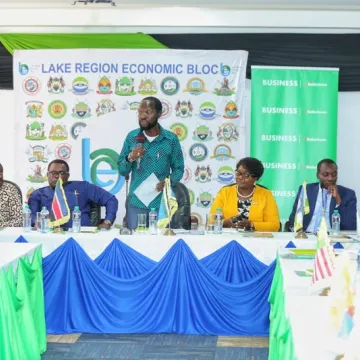Sh4.7Bn lifeline for smallholder farmers in lake region bloc

Cabinet Secretary for the National Treasury, John Mbadi
The Food and Agriculture Organization (FAO), in partnership with the Green Climate Fund, has pledged KES4.7 billion ($36 million) to revolutionize agricultural livelihoods in the Lake Region Economic Bloc.
This ambitious initiative aims to build climate-resilient, low-emission agricultural value chains, directly benefiting 2.7 million people—half of them women.
During the signing ceremony, a high-level Kenyan delegation, led by the Cabinet Secretary for the National Treasury, John Mbadi, underscored the urgency of the project.
Mbadi said that the agriculture sector remains highly vulnerable to climate change, making it critical to support smallholder farmers and producer cooperatives—those most affected by shifting climate patterns.
“While smallholders, including women and youth, and producer cooperatives may be the most vulnerable to the impacts of climate change, they are critical solutions and change actors to the challenges of climate change Kenya is facing,” noted Mbadi.
“The goal of the project is to promote climate-resilient and low-carbon practices in six value chains, including dairy, poultry, coffee, tea, fruit trees, and African leafy vegetables in the Lake Region Economic Bloc. Through the project, farmers will be trained and supported to adopt climate-smart technologies and practices for improved production, access to markets and increased incomes,” he added.
The initiatives led by the Food and Agriculture Organization of the United Nations (FAO) represent a major investment that will enhance vulnerable communities’ ability to adapt to climate change, improve livelihoods, and reduce greenhouse gas emissions.
“This landmark decision underscores the strength of FAO’s partnership with GCF and our central role in accelerating countries' access to climate finance,” said Kaveh Zahedi, Director of the FAO Office of Climate Change, Biodiversity and Environment, welcoming the news.
“Together we can continue scaling up solutions to simultaneously transform agrifood systems and achieve global climate mitigation and adaptation goals.”
CS Mbadi reaffirmed that the Kenyan government will fully support FAO's Green Climate Fund program to build climate resilience in the Lake Region Economic Bloc's agricultural sector and fully committed to its complete and successful implementation.
“This project will support smallholder farmers in Kenya in protecting their livelihoods against climate risk. GCF’s investment will strengthen agricultural value chains and increase community resilience,” Henry Gonzalez, Chief Investment Officer of the Green Climate Fund (GCF).
The funding and subsidiary agreements were signed on the same day between GCF, FAO, and the Government of Kenya, accelerating implementation of a new climate-resilient agricultural project in the Lake Region Economic Bloc, Kenya.
The initiative, implemented in collaboration with the Government of Kenya, Agriterra, and the Government of Denmark, will promote climate-resilient and low-carbon practices in six value chains: dairy, poultry, coffee, tea, fruit trees, and African leafy vegetables.
Furthermore, the project will also provide over 143,000 farmers (men and women) with training and support to adopt climate-smart technologies and practices, strengthening their resilience to climate change and increasing their household incomes.
This densely populated region is highly dependent on agriculture, but climate change impacts such as increasing temperatures, unpredictable rainfall and floods threaten food security and livelihoods.





